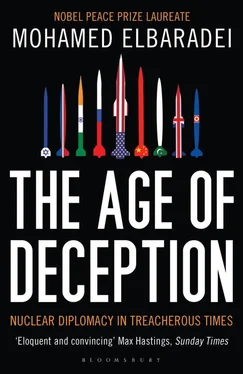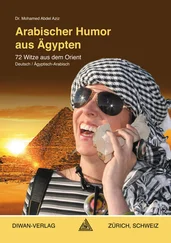Colin Powell’s dramatic address to the UN Security Council came one week later, on February 5. Listeners expected a definitive presentation of the intelligence on Iraq’s WMD programs. With characteristic charisma and force of presence, Powell reassured his audience, “My colleagues, every statement I make today is backed up by sources, solid sources. These are not assertions.” When it came to discussing the aluminum tubes, he acknowledged existing “differences of opinion,” but declared, “Most U.S. experts think they are intended to serve as rotors in centrifuges used to enrich uranium.”
Powell later told me he had spent a week at CIA headquarters, drilling their people on every piece of “evidence” and asking questions to ensure the veracity of the information. He added jokingly that if he had gone along with all their evidence his presentation to the council would have been a few hours long.
At the secretary-general’s private luncheon that followed Powell’s UN statement, Dominique de Villepin, the French foreign minister—an accomplished diplomat and historian, with a presence that rivaled Powell’s own—addressed Powell with what seems, in retrospect, like a prophecy: “You Americans,” he said, “do not understand Iraq. This is the land of Haroun al-Rashid. [8] Haroun al-Rashid, who ruled the Arab empire from Baghdad in the late eighth century, is a historical figure of mythic stature, considered the greatest of the Abbasid caliphs. Al-Rashid’s reign was marked by extraordinary cultural, scientific, and political prosperity.
You may be able to destroy it in a month, but it will take you a generation to build peace.”
Powell was visibly irritated. “Who is speaking about use of force?” he retorted—something of a bizarre comment, since the speech he had just delivered pointed in only one direction.
Ultimately, a painstaking analysis of the aluminum tubes issue in the New York Times , published when the war was in its second year, pointed out that two days before his Security Council speech, Powell’s intelligence experts had sent him a memo confirming that the United States used a seventy-millimeter tactical rocket that employed the same high-grade aluminum, with similar specifications. [9] David Barstow, William J. Broad, and Jeff Gerth, “How the White House Embraced Disputed Arms Intelligence,” New York Times , October 3, 2004.
Yet Powell declared that the tubes Iraq sought required a tolerance “that far exceeds U.S. requirements for comparable rockets.”
Another centerpiece of the case against the Iraqi regime was the allegation that Saddam Hussein had tried to purchase uranium from Niger. President George Bush had emphasized this point in his January 2003 State of the Union address: “The British government has learned that Saddam Hussein recently sought significant quantities of uranium from Africa.” Allegedly, between 1999 and 2001, Hussein’s representatives had tried to purchase five hundred tons of uranium oxide, yellowcake, from Niger. In late September 2002, the Blair administration in the United Kingdom revealed an intelligence dossier that included this assertion. The IAEA had been pressing for the relevant documentation ever since, in order to investigate, and after months of asking intelligence agencies for evidence of this illicit transaction, we were finally provided with copies of the papers on February 5, the same day as Colin Powell’s Security Council address.
Although the United Kingdom and the United States had taken more than three months to supply the “evidence”—a small sheaf of letters and communiqués between officials from Niger and Iraq—it took Jacques Baute and his team only a matter of hours to figure out that the documents were fake. One letter, alleged to be from the president of Niger, Mamadou Tandja, was full of inaccuracies and had an obviously falsified signature. Another letter from October 2000, supposedly from the Niger minister of foreign affairs and cooperation, bore the “signature” of Allele Habibou; but Minister Habibou had not held office since 1989.
Nor was the purported sale logically plausible. Niger is one of the world’s largest uranium producers. The output of the two uranium mines in question is a valuable commodity, an important supply line for Japanese, Spanish, and French nuclear power companies. Sales and production are under constant supervision, not just by Niger but also by foreign entities. The notion that five hundred tons of yellowcake—enough to produce roughly one hundred nuclear bombs—could be shipped out to Iraq undetected was absurd.
Even more puzzling was the fact that a forgery that had escaped detection through months of examination by the world’s top intelligence agencies was immediately exposed by an IAEA physicist using Google searches and common sense. Equipped with his conclusions about the Niger documents, Jacques consulted with a number of Western officials. They had nothing to say. Not once in the days that followed did a single American or British official dispute the logic of the IAEA analysis.
I deliberated on how to break the news to the Security Council without overly embarrassing Washington or London. On the flight to New York, consulting with Jacques Baute and Laura Rockwood, I finally decided to use less sensational terminology, describing the documents as “not authentic.” But of course the message was clear: the Niger uranium sales allegation, a keystone of the U.S. and U.K. case insisting that Iraq had reconstituted its nuclear weapons program, was based on a fraud.
The United States was clearly unhappy when I reported this conclusion to the Security Council. It compounded our earlier debunking of the aluminum tubes issue. Colin Powell, who always kept his cool and was unfailingly courteous to me, reacted at the council meeting somewhat peevishly, pointing out that the Agency had “missed Iraq” in 1991.
The reaction in the media was disheartening. The major media organizations at the time had completely bought into the WMD claims by the U.S. administration. Yet our findings were discounted on the grounds that they were unimportant. The Washington Post , on March 1, referred to the Niger documents as “one secondary bit of evidence,” declaring that it was “not central to the case against Saddam Hussein.” Not to be outdone, the Wall Street Journal on March 13 published an editorial pointedly titled “Bush in Lilliput.” “Mr. ElBaradei,” they wrote, “made a public fuss last week about one British-U.S. claim that turns out to have been false, but which was in any case peripheral to Iraq’s weapons of mass destruction.” Neither newspaper bothered to mention that, less than two months earlier, the Niger uranium sale had been significant enough for the president of the United States to feature it in his State of the Union address. The coverage in the New York Times was similarly dismissive. On March 8, the Niger issue was mentioned in passing in a cover story focused on the “UN Split.” The next day, the story was covered more fully (“Forensic Experts Uncovered Forgery on Iraq, an Inspector Says”)—but relegated to page 13.
Efforts on the diplomatic front seemed equally ill-fated. When the Arab states met at an emergency summit before the war, on March 2, in Sharm el-Sheikh, it erupted into a circus of petty disagreements and name-calling. There were serious proposals on the table about sending a delegation to Iraq to offer possible solutions that could avoid a war. Some wanted to urge Saddam Hussein to resign. The ruler of the United Arab Emirates at that time, Sheikh Zayed bin Sultan al-Nahyan, wanted to offer Saddam Hussein asylum as a face-saving way out.
Other Arab leaders, however, appeared to be supportive of the war. They clearly loathed Saddam Hussein and hoped an invasion of Iraq would get rid of him altogether. Early in the inspections process I had met with the president of Egypt, Hosni Mubarak, who obviously had a personal grudge against Saddam Hussein; he kept saying that Saddam had double-crossed him during the first Gulf War, when he invaded Kuwait after giving Mubarak assurances to the contrary. I briefed Mubarak about our activities in Iraq but also tried to direct the conversation to a relevant broader theme, urging him to lead a movement of modernization and moderation in the Arab world. “If that were to happen,” I said, “Egypt would get support pouring in from every front, both politically and economically.”
Читать дальше












